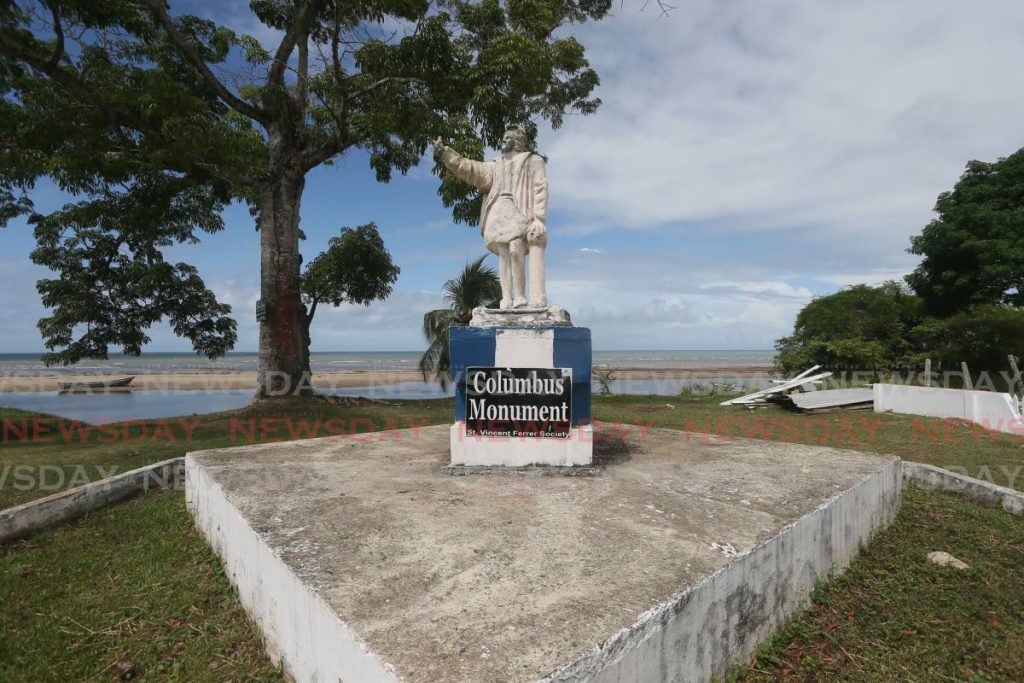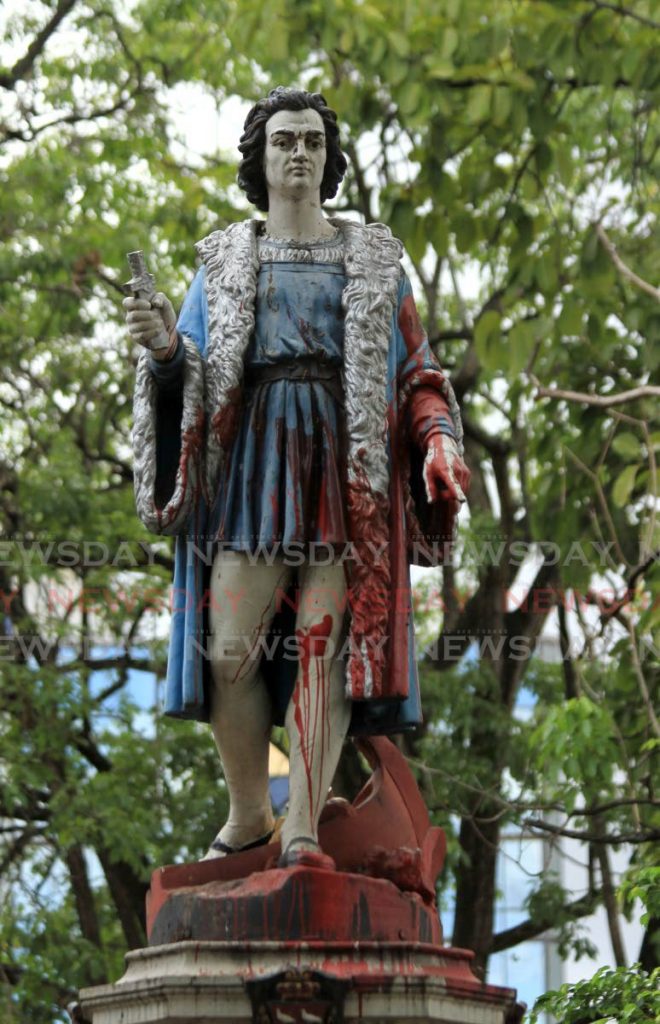Kambon: Remove all colonial monuments, not just Columbus

DESPITE calls for the removal of a statue of Christopher Columbus on Independence Square, Port of Spain, likely to bear fruit in the near future, the matter of unwanted colonial monuments is far from over.
Port of Spain Mayor Joel Martinez, in a morning programme recently, said his council will take a vote for its removal, which will then probably go to Cabinet for approval. There are also impending discussions surrounding a replacement monument. The First Peoples of Santa Rosa and the Warao Nation (indigenous people) suggest a freedom fighter. The Cross Rhodes Freedom Project, led by Shabaka Kambon, agrees.
On the programme, the mayor, who in recent years steered clear of the topic surrounding colonial monuments in the city, like the statue of Columbus, appeared to have softened his stance. The corporation posted a poll on its Facebook page on Thursday asking the public whether the statue should be removed.
Yet Kambon sees the issue as a low-hanging fruit, even if the statue hasn't yet been taken down. Now, he says, the people want nothing less than a tribunal established specifically to identify such monuments and place names, which ought to be replaced and renamed.
Cross Rhodes is ironically named after Cecil Rhodes, a statesman and white supremacist, for which Rhodesia (now Zimbabwe) was named. It is one of the latest of a number of bodies, which have called for the monument's removal long since the 1970s.
"Most people understood the contradiction of having an Independence Square and the man who started colonialism (on it)," Kambon told Sunday Newsday. "The point is, now, to have it not just taken down, but replaced and for the entire country to understand why. We don't want people to be upset. They need to understand the reason."
"It's (currently) still there for a number of reasons," he said. "One is that the groups of people who have wanted to literally go and take it down, we've always discouraged them. And maybe in time, I might have to take responsibility if things don't go right."
"It's also there because you have an older generation, who drank the Kool-Aid, which the colonials left in their wake for them to drink in the education system. They bought into the hero myth of Columbus and stood as gatekeepers."
The statue is located in Columbus Square, near to the corner of Independence Square and Duncan Street. It was opened by acting governor William Young in 1881 and the statue was donated by a wealthy cocoa tradesman named Hypolite Borde.
Columbus is often wrongly credited with discovering TT as there were settlements of indigenous tribes on both islands prior to his arrival in 1498.
Conversely, historians agree that Columbus's arrival followed the decimation of much of the indigenous population in TT and many other parts of the Americas via conquest.
Calls for the removal of the monument, and other relics of TT’s colonial past, have gained traction in recent days. It is believed to have been reignited by the death of George Floyd in the United States, who suffocated when a policeman knelt on his neck for almost 10 minutes.

His death sparked protests worldwide, including in the UK, Belgium, Germany and many other countries. In the US, statues of Columbus, along with Confederate monuments have been toppled.
The fact that Columbus and Confederate monuments are being removed or toppled in the United States, Kambon added, speaks volumes.
Newsday reported several times within the past three years of incidents in which various groups, including the Santa Rosa First Peoples of Arima have lobbied for the removal of the statue and other similar colonial monuments. Martinez has consistently steered clear of the issue.
"What we asked for in 2017 was a national dialogue and I think they were well aware that if there was a discussion about it, Columbus would go."
In June, 2018, the mayor said he was under no pressure to remove the statue. He said those opposed to it represent "a very small group," in reference to the First Peoples of Santa Rosa.
And last week, the Queen of the Warao Nation Donna Bermudez-Bovell, joined in the call for Martinez to schedule an urgent meeting to discuss the removal of the statue and have it replaced with a freedom fighter.
On Friday, Martinez appeared on a morning television programme after having seen a petition containing over 2,000 signatures, set up by Cross Rhodes Freedom Project. The petition now has over 7,500.
"I have had discussions with my council," Martinez said. "We have been listening to what has been happening internationally and I am very much open to further discussions on it," said Martinez.
The Columbus statue has been defaced for decades, often causing the Port of Spain City Corporation to have it removed and cleaned.
"I understand the movement is growing and I enjoy the enthusiasm and the passion ... Maybe it's time now. It's been happening internationally.
Kambon, however, said the council must also address the names of several squares and streets and roads, which need to change as they glorify some of TT history's most notorious governors and colonial figureheads. He said he doesn't think negatively about the mayor, believing that he, too, is from a category of people who bought into the "hero myth."
Kambon said the Moruga 500 committee, however, also fell into that category as it continued to preserve the traditional narrative of Discovery Day, even after it was replaced by Emancipation Day in 1985.
Dismissing the notion that locals are following the US, Kambon said, "We've always been ahead of the game when it comes to (not) celebrating Christopher Columbus. This country is one of the first, if not the first, to stop celebrating Discovery Day."
According to the Emancipation Support Committee, the colonial authorities declared August 1 a holiday in the 1920s. However, commemorations of emancipation also continued.
"A prominent celebration was that organised by the NWSCA (Negro Welfare Social and Cultural Association – called the Negro Welfare Association), founded by Elma Francois and later led by Jim Barrette and Christina King.
"In the 1930s they adapted their celebration to commemorate Discovery Day along with Emancipation Day, fighting to ensure the preservation of this sacred memory against the overwhelming official and media focus on Columbus. But by the end of the 1950s the emancipation commemoration had declined considerably.
"Significantly, however, it was kept alive in small pockets by some elders who felt deeply committed to this sacred memory. A few nationally prominent stalwarts like George Weekes consistently advocated its revival. This was eventually accomplished by the National Joint Action Committee in the early 1970s."
"Decolonising the Caribbean" is a notion picking up traction regionally.
Director of the Centre for Reparation and Jamaican history scholar Verene Shepherd wrote a letter in the Gleaner in Jamaica, saying it is time to "decolonise" the Caribbean through the removal of symbols and monuments and replace them appropriately.
"(Symbolic decolonisation) has a long history in the Caribbean, part of which involves erecting monuments to those who fought for freedom in the Caribbean.
"This explains the proliferation of statues to freedom fighters or supporters of Caribbean decolonisation on the regional landscape from the Guianas through Haiti to The Bahamas and Bermuda," she wrote.
"Alongside this project of ensuring that our own icons are transferred from text to public space has been a parallel movement to remove the stamp and image of colonial figures from the Caribbean, rename streets and buildings and indigenise awards and honours," a movement she said resurfaced following the police killing of George Floyd in Minnesota.
"It is within this context that statues of Christopher Columbus (whose voyages unleashed such terror on the indigenous peoples and paved the way for the enslavement of Africans); traders in enslaved Africans (Edward Colston and Robert Milligan); US Confederate leaders and monarchs like King Leopold II of Belgium who unleashed terror on the Congo (and who was first cousin of Queen Victoria, whose statue stands in many Caribbean countries), are being toppled in the USA, UK and Belgium, respectively."
Kambon said Columbus is done and dusted and now is time for a complete overhaul of Port of Spain colonial scars.

Comments
"Kambon: Remove all colonial monuments, not just Columbus"